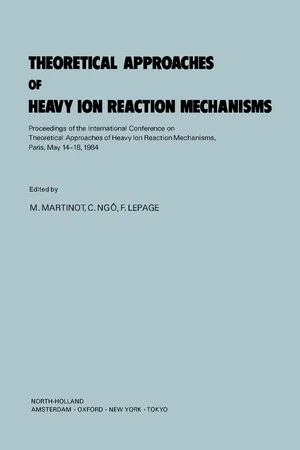
Theoretical Approaches of Heavy Ion Reaction Mechanisms
Proceedings of the International Conference on Theoretical Approaches of Heavy Ion Reaction Mechanisms, Paris, May 14–18, 1984
- 442 pages
- English
- PDF
- Available on iOS & Android
Theoretical Approaches of Heavy Ion Reaction Mechanisms
Proceedings of the International Conference on Theoretical Approaches of Heavy Ion Reaction Mechanisms, Paris, May 14–18, 1984
About this book
Theoretical Approaches of Heavy Ion Reaction Mechanisms provides information pertinent to heavy ion reactions and nuclear fission at low energies. This book discusses the features of the time-dependent solution of the Kramer–Chandrasekhar equation. Organized into 27 chapters, this book begins with an overview of the deexcitation process of a highly excited nucleus by means of its decay into two fragments. This text then presents a microscopic description to extract the characteristics features of the collective dynamics of the fission process at low energy. Other chapters consider nuclear fission as a transport process over the fission barrier. This book discusses as well the microscopic foundations of the phenomenological collective models. The final chapter deals with the composition of the baryons and mesons in terms of gluons and quarks. This book is a valuable resource for nuclear and high energy physicists. Experimentalists, theoreticians, and research workers will also find this book useful.
Frequently asked questions
- Essential is ideal for learners and professionals who enjoy exploring a wide range of subjects. Access the Essential Library with 800,000+ trusted titles and best-sellers across business, personal growth, and the humanities. Includes unlimited reading time and Standard Read Aloud voice.
- Complete: Perfect for advanced learners and researchers needing full, unrestricted access. Unlock 1.4M+ books across hundreds of subjects, including academic and specialized titles. The Complete Plan also includes advanced features like Premium Read Aloud and Research Assistant.
Please note we cannot support devices running on iOS 13 and Android 7 or earlier. Learn more about using the app.
Information
Table of contents
- Front Cover
- Theoretical Approaches of Heavy Ion Reaction Mechanisms
- Copyright Page
- Table of Contents
- PREFACE
- CHAPTER 1. FISSION AT FINITE TEMPERATURE: IS KRAMERS' DESCRIPTION ADEQUATE?
- CHAPTER 2. MICROSCOPIC ANALYSIS OF COLLECTIVE DYNAMICS IN LOW ENERGY FISSION
- CHAPTER 3. EFFECTS OF TRANSIENTS ON PARTICLE EMISSION PRIOR TO FISSION IN A TRANSPORT DESCRIPTION OF THE FISSION PROCESS
- CHAPTER 4. AN INTRODUCTION TO THE ADIABATIC TIME-DEPENDENT HARTREE-FOCK METHOD
- CHAPTER 5. MASS DISPERSIONS IN A TIME-DEPENDENT MEAN-FIELD APPROACH
- CHAPTER 6. MEAN-FIELD DESCRIPTION OF NUCLEI AT HIGH TEMPERATURE
- CHAPTER 7. FAST NUCLEON EMISSION : A PROBE OF THE HEAVY ION REACTIONS AT ENERGIES BELOW 100 MeV/u
- CHAPTER 8. KNOCK OUT FOR SUBTHRESHOLD PION PRODUCTION
- CHAPTER 9. A FEEDBACK PROCESS CONTROLLING ENERGY PARTITION AND MASS EXCHANGE BETWEEN HEAVY IONS
- CHAPTER 10. OPEN QUESTIONS: THERMALIZATION AND FLOW, KINETIC OR POTENTIAL DRIVEN?
- CHAPTER 11. DYNAMICS OF FISSION AND HEAVY ION REACTIONS
- CHAPTER 12. ELASTOPLASTICITY OF FINITE FERMI SYSTEMS
- CHAPTER 13. NUCLEAR FOG
- CHAPTER 14. MACROSCOPIC TREATMENT OF NUCLEAR DYNAMICS
- CHAPTER 15. PARTICLE EXCHANGE AS THE DISSIPATIVE MECHANISM IN NUCLEUS-NUCLEUS COLLISIONS
- CHAPTER 16. FRICTION, IMAGINARY POTENTIAL AND NUCLEON JETTING CALCULATED FROM NUCLEON CURRENTS IN SEMI-INFINITE NUCLEAR MATTER
- CHAPTER 17. DYNAMICS OF ANGULAR MOMENTUM ACCUMULATION IN DAMPED NUCLEAR REACTIONS
- CHAPTER 18. MICROSCOPIC APPROACH TO REAL AND IMAGINARY PART OF THE HEAVY ION POTENTIAL
- CHAPTER 19. TIME-INDEPENDENT WAVE-PACKET THEORY OF COLLISIONS
- CHAPTER 20. PIONIC BREMSSTRAHLUNG IN HEAVY-ION COLLISIONS
- CHAPTER 21. SINGLE–PARTICLE AND COLLECTIVE ASPECTS OF THE ABSORPTIVE POTENTIAL FOR HEAVY ION REACTIONS
- CHAPTER 22. NUCLEAR PHYSICS WITH HEAVY IONS - MANY BODY SYSTEMS WITH SPECIFIC FLAVOUR
- CHAPTER 23. MULTIFRAGMENTATION AND EVAPORATION: TWO COMPETING PROCESSES IN INTERMEDIATE ENERGY NUCLEAR COLLISIONS
- CHAPTER 24. HYDRODYNAMICS OF A QUARK-GLUON PLASMA
- CHAPTER 25. COLLECTIVE FLOW IN RELATIVISTIC HEAVY-ION COLLISIONS: A CONFIRMATION OF HYDRODYNAMICS
- CHAPTER 26. REVIEW OF THE INTRANUCLEAR CASCADE MODEL FOR HEAVY ION REACTIONS
- CHAPTER 27. CONCLUDING REMARKS
- LIST OF SHORT CONTRIBUTIONS
- LIST OF PARTICIPANTS
- AUTHOR INDEX